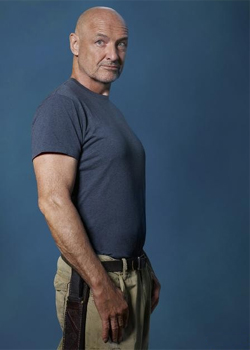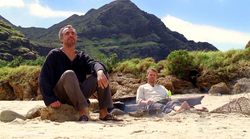At the conclusion of LOST's fifth season, we learned about a certain "Man in Black" (let's call him Esau) who appears to be the adversary of the mystical Jacob. This character made a clear threat to Jacob that he will try to kill him at some point. Jacob did not seem concerned until he was being killed by Ben, who was being guided by Esau disguised as John Locke. We also learned that the John Locke of season five was actually dead, and we were watching Esau pretending to be John Locke in order to fool Ben into following him. Wow! That was confusing! Nevertheless, we need to take a second and answer a question: Why was John Locke chosen by Esau? Why not Jack? Sawyer? To investigate means to watch the series from the beginning; it will also gear me up for the final season, beginning in January 2010.
Only three episodes into the series, it's interesting to look closely at Locke. While Jack is trying to save Kate's U.S. Marshall and Sayid is playing with blocked radio frequencies, Locke is busy observing. Call this a hypothesis, rather than a theory. What if Locke died on the plane? What if Locke has never been "Locke"? What if he is Esau? While there might be many holes in the hypothesis, there is evidence as well. We know that Locke's flashback's will reveal that he was crippled by his father's window push and somehow began walking on the island. But is this actually possible? Or is it Esau walking on the island? Further, we must remember that the flashbacks are not memories. They are flashbacks that provide information. We learn information about John Locke off the island. This is not proof that the John Locke "on the island" experienced any of those events. Further, in the Locke flashbacks, have we ever seen evidence that this wheel-chair-bound man would know how to kill a wild boar? No. But Esau, who has been on the island for centuries, would.
In the first three episodes, John Locke observes the other islanders trying to survive. After helping Jack move victims in the first few moments of the series, John Locke does nothing to help others until he finally finds Vincent - Walt's dog - by creating a dog whistle. Before this, he does have a very interesting exchange with the young boy about the game of backgammon. Not only does he talk about how the ancient game is over 5000 years old (how old would Esau be?), but he also points out the battle between the white and black pawns. On the surface, this appears to be something of a race reference since Walt is African American, but it could also refer to Jacob (who was wearing white at the top of season five's finale) and the "man in black."
One must also point out the unusual ending of episode three, entitled "Tabula Rasa." We hear the song "Washed Away" coming out of Hurley's earphones as we see the first acts of kindness and community of the island. Boone (oh, remember Boone?) gives Shannon (OH, remember Shannon?) a pair of repaired sunglasses, Sayid gives Sawyer a piece of fruit, and Michael brings Walt his dog (found by Locke). Locke does not do anything but watch. There is definitely a creepy feeling emulating from the still-mysterious Locke as he watches the father and son finally communicate. Though the "bomp" is more calming that what we will get used to in the series run. Could it be that Esau, our "man in black" is watching his plan form? If so, is that the secret "miracle" he tells Walt about and not the fact that he could not walk before crashing on the island? If the miracle is their arrival on the island, that would explain Locke's insistence that they remain on the island. It should also be mentioned that the title "Tabula Rasa" refers to a theory by the philosopher John Locke. Simply, it states that we are born blank. We have the freedom to be the author's of our own souls. It is actually Jack who makes the reference to the theory when he tells Kate that he believe they should all "start over" since they are not on the island. Perhaps Esau agrees.
After more episodes, many of these thoughts might be proven wrong. That is my new project. I will look closely at Locke and write as frequently as possible about whether or not John Locke might actually be Esau, the "Man In Black" the entire series!


